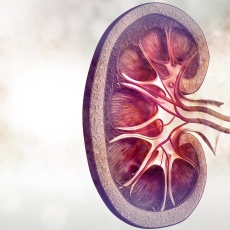
You have two kidneys, each about the size of your fist. They are near the middle of your back, just below the rib cage. Inside each kidney there are about a million tiny structures called nephrons. They filter your blood. They remove wastes and extra water, which become urine. The urine flows through tubes called ureters. It goes to your bladder, which stores the urine until you go to the bathroom.
Most kidney diseases attack the nephrons. This damage may leave kidneys unable to remove wastes. Causes can include genetic problems, injuries, or medicines. You have a higher risk of kidney disease if you have diabetes, high blood pressure, or a close family member with kidney disease. Chronic kidney disease damages the nephrons slowly over several years. Other kidney problems include:
- Chronic Kidney Disease (National Library of Medicine)... help control blood pressure, and make hormones. Chronic kidney disease (CKD) means that your kidneys are damaged and ... people don't have any symptoms until their kidney disease is very advanced. Blood and urine tests are ...
- Kidney Diseases (National Library of Medicine)... urine until you go to the bathroom. Most kidney diseases attack the nephrons. This damage may leave kidneys ... or medicines. You have a higher risk of kidney disease if you have diabetes, high blood pressure, or ...
- Autosomal dominant tubulointerstitial kidney disease-UMOD (ADTKD-UMOD) is part of a group of disorders (collectively called autosomal dominant tubulointerstitial ...
- Medullary cystic kidney disease type 1 (MCKD1) is an inherited condition that affects the kidneys. It leads to scarring (fibrosis) and impaired function of the kidneys, ...
- Autosomal dominant tubulointerstitial kidney disease (ADTKD) is a group of inherited conditions that affect the tubules of the kidneys, causing the kidneys to gradually ...
- Kidney Cysts (National Library of Medicine)... which cause kidney cysts. One type is polycystic kidney disease (PKD). It runs in families. In PKD, many ... kidney failure, dialysis or kidney transplants. Acquired cystic kidney disease (ACKD) happens in people who have chronic kidney ...
- REN-related kidney disease is an inherited condition that affects kidney function. This condition causes slowly progressive kidney disease that usually becomes ...
- Polycystic kidney disease is a disorder that affects the kidneys and other organs. Clusters of fluid-filled sacs, called cysts, ... organs, particularly the liver.Frequent complications of polycystic kidney disease include dangerously high blood pressure (hypertension), pain in ...
- ... changes to your diet when you have chronic kidney disease (CKD). These changes may include limiting fluids, eating ... need to alter your diet more if your kidney disease gets worse, or if you need dialysis .
- Polycystic kidney disease (PKD) is a kidney disorder passed down through families. In this disease, many cysts form in the ... kidneys may be needed. Treatments for end-stage kidney disease may include dialysis or a kidney transplant .



